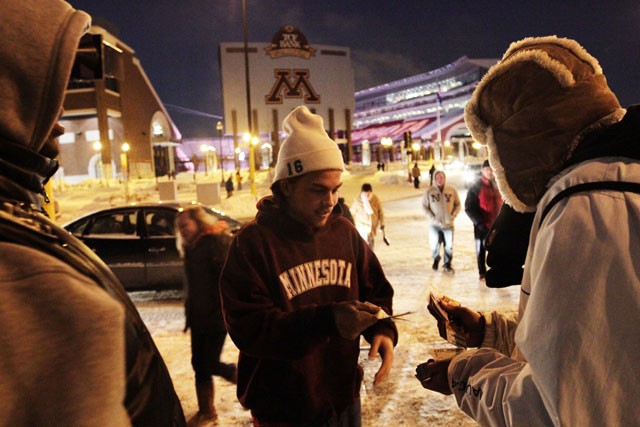The Minnesota Vikings, Twins and Timberwolves spoke out Wednesday against a bill that would prevent online event sellers from regulating ticket re-sales.
Sen. Chris Gerlach, R-Apple Valley, has proposed a bipartisan bill in the state Senate seeking to prohibit venues such as Xcel Energy Center and Target Field from selling online tickets that restrict re-sales or transfers like those that take place on websites such as StubHub.
Gerlach said citizens have the right to transfer or re-sell a ticket once they buy it.
âÄúThis is about the right of the consumer to transfer tickets without undue restriction,âÄù Gerlach said.
GerlachâÄôs bill is aimed at non-transferrable paperless ticket sales online, which prohibit re-sales or transfers unless the original sellerâÄôs website is used for the transaction. In many cases, the website will not allow a ticket to re-sell for less than its original price.
Gerlach said the bill, which was heard in the Senate Commerce and Consumer Protection Committee, protects the secondary market that was created in 2007, when the Legislature legalized ticket scalping.
Representatives for the Target Center, Xcel Energy Center and almost all of the Minnesota professional sports teams said the bill makes it more difficult for fans to get event tickets at face value.
Randy Levy, owner of We Fest, said high-profile artists use paperless ticket sales online that are non-transferrable to ensure that fans get tickets for the original price rather than paying more money to online bots or scalpers that gobble up most of the tickets once they go on sale.
Levy said if the bill passes, artists like Bruce Springsteen or Garth Brooks might choose not to come to Minnesota.
âÄúWe are fighting this battle for the fans,âÄù Levy said.
David Balcer, a representative for the Target Center, said Miley Cyrus also uses non-transferrable online sales so scalpers donâÄôt re-sell her tickets with a markup of up to 300 percent.
Dustin Brighton, a spokesman for eBayâÄôs re-sale ticket service, StubHub, said the bill protects a consumerâÄôs ownership rights to a ticket. He said online ticket sales restricting transferability trap people into keeping unwanted tickets.
Still, Balcer said the Target Center and other large event venues refund full prices if the customer no longer wants the ticket.
Minnesota Twins President Dave St. Peter said this bill would make a problem for fans even worse.
St. Peter said despite speculation, weather was not Target FieldâÄôs biggest problem in its opening season âÄî scalpers were. He said the bill would further inhibit Twins fans from being able to get tickets at face value by allowing online out-of-state scalpers to greatly raise prices.
While the Twins and Vikings oppose the bill, they admit that they donâÄôt sell paperless non-transferrable tickets. But thatâÄôs the direction things are going, St. Peter said.
Since its introduction, the bill has undergone numerous changes due to talks with opponents, Gerlach said.
The bill originally exempted all venues from prohibiting ticket sale regulations below 1,000 seats. That number was raised to 2,500. A section that required online ticket sellers to fully refund a ticketâÄôs price for a canceled event was also removed.
Sen. Sandra Pappas, DFL-St. Paul, said at first glance, GerlachâÄôs proposal looked good. But after hearing testimony, she thinks the bill would adversely affect Minnesotan fans.
Pappas said the legislation seems to protect out-of-state interests like big-time Internet scalpers rather than Minnesotans who attend events.
The bill will be voted on in the committee next Wednesday, giving time for further changes that might appease opponents, Gerlach said.

Image by Joe Michaud-Scorza
A high school student sells four Gopher men’s hockey tickets for ten dollars apiece to scalpers on Saturday outside Mariucci Arena.
Sports, concert venues call foul on tickets bill
The bill would prevent online sellers from restricting buyers from re-selling tickets.
Published March 3, 2011
0
More to Discover







